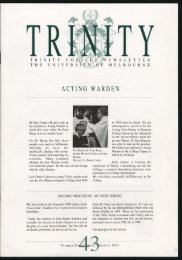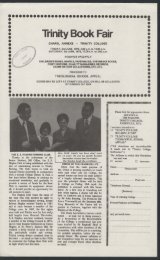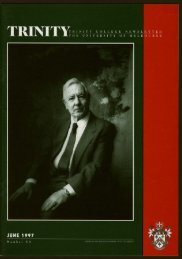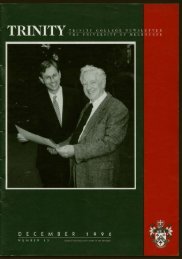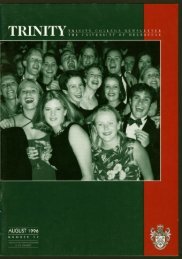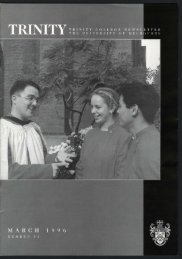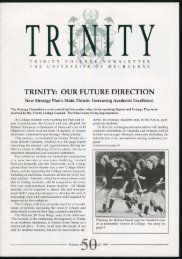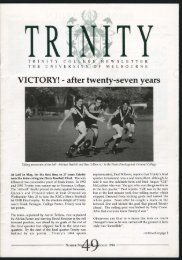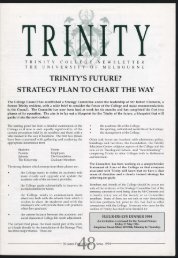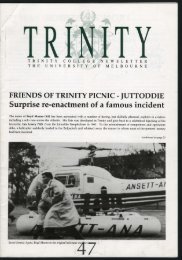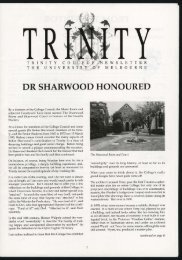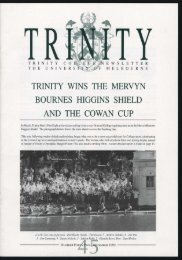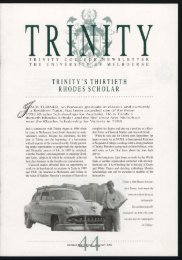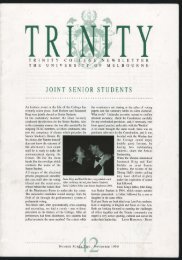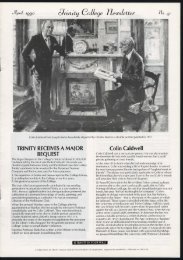Trinity College Newsletter, vol 1 no 6, May 1971
You also want an ePaper? Increase the reach of your titles
YUMPU automatically turns print PDFs into web optimized ePapers that Google loves.
TRINITY<br />
Newskfret<br />
COLLEGE<br />
A PUBLICATION OF TRINITY COLLEGE WITHIN THE UNIVERSITY OF MELBOURNE<br />
No. 6 MAY, <strong>1971</strong><br />
S. A. WYNNE SCHOLARSHIP<br />
The generosity of a group of friends of Mr. Sydney Wynne has enabled the <strong>College</strong><br />
Council to establish an endowed scholarship which bears his name and which<br />
commemorates his many years of invaluable service to the <strong>College</strong>.<br />
Mr. Wynne retired from his position of<br />
Overseer early in 1970 after fifty years of<br />
devoted work for the welfare of the<br />
<strong>College</strong> and its members. Many and<br />
many a student over the generations,<br />
tutors, college officers and members of the<br />
domestic staff have k<strong>no</strong>wn his helping<br />
hand, his plain speaking, his sensible<br />
advice, his firmness when firmness was<br />
required and, at bottom, his generosity<br />
and kindness.<br />
The response by Mr. Wynne's friends,<br />
most of them already contributors to the<br />
general <strong>College</strong> Appeal, to the approach<br />
made to them (largely through the energy<br />
of the Senior Tutor, Dr. A. J. Buzzard),<br />
has been most gratifying. The appeal for<br />
this scholarship is still open and contributions<br />
to the general <strong>College</strong> Appeal may<br />
be earmarked by the do<strong>no</strong>r for this<br />
special purpose. One scholarship has been<br />
established and it is hoped that further<br />
contributions will enable a second scholarship<br />
to be endowed.<br />
The first S. A. Wynne Scholar is Mr. C.<br />
D. Cordner, a resident member of the<br />
<strong>College</strong> and a member of the University<br />
Blacks football team, <strong>no</strong>w in the final year<br />
of a distinguished ho<strong>no</strong>urs course in<br />
Philosophy and English.<br />
Mr. C. D. Cordner,<br />
first S. A. Wynne Scholar.<br />
DEATH OF MR. WYNNE<br />
While this <strong>Newsletter</strong> was at the<br />
printers the <strong>College</strong> learnt, with great<br />
sorrow, of the death of Sydney ("Syd")<br />
Arthur Wynne, on 22nd April at Ferntree<br />
Gully.<br />
THE BUILDING PROGRAMME<br />
In November, 1970, the <strong>College</strong> lodged<br />
its Submission to the Australian Universities'<br />
Commission for the Triennium 1973-<br />
1975. The Submission proposes the<br />
completion of the current re<strong>no</strong>vation programme,<br />
begun with Leeper in 1964-1965,<br />
and looks ahead to some increase in residential<br />
places (<strong>no</strong>t necessarily of the<br />
traditional kind), more tutorial and meeting<br />
rooms, and better facilities for <strong>no</strong>nresident<br />
students. (Because it is still<br />
before the Commission the details of the<br />
Submission are at present confidential.)<br />
All the projects described in the Submission<br />
seem to the <strong>College</strong> Council to be<br />
essential. Only the support of Appeal<br />
funds, however, will make them possible.<br />
COLLEGE APPEAL<br />
$139,432<br />
S<br />
- 150.000.00<br />
135,000.00<br />
120,000.00<br />
105,000.00<br />
90,000.00<br />
75,000 DO<br />
50,000.00<br />
45,000.00<br />
30,000.00<br />
15,000.00<br />
00,000.00<br />
TOTAL AS AT 16/4/71<br />
THE PROBLEM OF COLLEGE FEES<br />
The Warden writes: For the first time for a<br />
very long while indeed — in our case,<br />
since the 1930's — the men's <strong>College</strong>s this<br />
year have experienced real difficulty in<br />
filling their places, and some (including<br />
ourselves) still have vacancies.<br />
The situation is complex, and I can<strong>no</strong>t<br />
here examine it in full. While there are<br />
various factors at work, it is certain,<br />
however, that the principal reason for the<br />
shortfall in entries and re-entries is the<br />
size of <strong>College</strong> fees. An increasing proportion<br />
of students and their parents find<br />
them unacceptable. This is despite the<br />
fact that there is an overall shortage of<br />
residential accommodation for students in<br />
the vicinity of the University.<br />
Our fees are high primarily because<br />
household costs are so high; and our<br />
household costs will remain high even<br />
with the most careful and eco<strong>no</strong>mic<br />
management.<br />
It is <strong>no</strong>t that our fees have risen out of<br />
all proportion to the general increase in<br />
costs throughout the community; it can<br />
be shown that the contrary is the case.<br />
What has happened is that priorities have<br />
changed. For good or ill, students and<br />
their parents are less prepared than they<br />
once were to pay large sums out of their<br />
private pockets for anything connected<br />
with tertiary education.<br />
MORE ENDOWMENTS NEEDED<br />
If, as I believe, we must <strong>no</strong>w recognize<br />
this as the long-term situation, then action<br />
must be taken to reduce the fees, or at<br />
least to stabilize them: for reasons which<br />
are <strong>no</strong>t only eco<strong>no</strong>mic, the <strong>College</strong> can<strong>no</strong>t<br />
afford vacancies.<br />
Something can be achieved (and is being<br />
achieved) by internal re-arrangements.<br />
All <strong>College</strong>s are pressing for further Gov-<br />
ernment subsidies. What I should like to<br />
stress particularly in this <strong>Newsletter</strong>,<br />
however, is the importance of increasing<br />
our endowments — the urgent importance<br />
of increasing them substantially. It would<br />
help the fees problem a great deal if<br />
certain areas of <strong>College</strong> expenditure —<br />
such as the educational establishment,<br />
scholarships and bursaries, the Library<br />
and (perhaps above all) a proportion of<br />
building maintenance — were a charge<br />
upon endowment income alone. It is<br />
worth remarking that we have only half<br />
the endowment of Ormond <strong>College</strong>, and<br />
that it is for this reason that our fees must<br />
be set significantly higher than theirs;<br />
Ormond, be it <strong>no</strong>ted, is full.<br />
It is my hope that a sustained and systematic<br />
effort to improve our endowment<br />
situation will mark our entry into our<br />
second century.<br />
99<br />
That is our age this year — ninety-nine<br />
— and planning is well advanced for the<br />
celebration of our Centenary in 1972.<br />
Finals details are yet to be settled, but<br />
ideas under consideration include a special<br />
centenary publication (probably a "coffeetable"<br />
book about the <strong>College</strong>), a grand<br />
academic occasion, a Cathedral Service,<br />
and a Ball. Most of the functions would<br />
occur in the latter half of the year. The<br />
Cathedral is booked for the after<strong>no</strong>on of<br />
Sunday, 2nd July, being one hundred<br />
years to the day after the enrolment of<br />
the first <strong>Trinity</strong> student (John Francis<br />
Stretch, later a Bishop).
Page 2 NEWSLETTER <strong>May</strong>, <strong>1971</strong><br />
TRAGIC DEATH OF<br />
DR. BARRY MARSHALL<br />
The last issue of the <strong>Newsletter</strong> (June,<br />
1970) reported the departure of Dr.<br />
Marshall for England and published his<br />
own review of his years at <strong>Trinity</strong> as<br />
student, Chaplain and Joint Acting<br />
Warden. Within two months he was dead.<br />
He died in Oxford on 12th August, from<br />
injuries received in a fall at Pusey House,<br />
of which he was about to become Principal.<br />
Characteristically, he was at the<br />
time of the fall acting as his own handyman<br />
and changing a light globe on a<br />
staircase.<br />
A Eucharist of Thanksgiving for his<br />
life and priesthood was held in the Chapel<br />
of this <strong>College</strong> on 15th August, and his<br />
cremated remains were interred beneath<br />
the pavement of the Chapel at a Burial<br />
Service on 24th August.<br />
Fuller accounts and remembrances of<br />
this remarkable and much-loved man —<br />
surely one of the greatest and most influential<br />
scholar-priests this <strong>College</strong> has<br />
produced — will be found in the 1969 and<br />
1970 editions of the Fleur de Lys. Later<br />
this year it is hoped to publish a small<br />
memorial <strong>vol</strong>ume, with contributions from<br />
men and women who knew him at different<br />
stages of his life and in various<br />
contexts.<br />
A Marshall Memorial Fund has been<br />
opened. It is proposed that the income<br />
from the Fund should be applied to<br />
extend —<br />
(1) the ministry and witness of the<br />
<strong>College</strong> Chapel, especially in its liturgical,<br />
pastoral and apologetic aspects. It is<br />
hoped to sponsor such activities as<br />
addresses, festivals and exhibitions, and to<br />
enrich the Chapel furnishings with choice<br />
works of fine or applied art;<br />
(2) the resources of the <strong>College</strong><br />
Library, in both its theological and<br />
general sections, bearing in mind his own<br />
particular scholarly interests.<br />
Some copies of the Fleur de Lys for 1969<br />
and 1970 are still available from the <strong>College</strong>.<br />
A recording was issued of the Eucharist of<br />
Thanksgiving, which includes the sermon<br />
preached by his former <strong>College</strong> study-companion,<br />
the Venerable Stanley Moss; copies of<br />
the recording are also available.<br />
Names are being registered <strong>no</strong>w for reserved<br />
copies of the memorial book.<br />
The Memorial Fund has already been<br />
generously supported; it is still open, and contributions<br />
(which are tax-deductible) may be<br />
sent to the <strong>College</strong>.<br />
A return slip for these various purposes is<br />
included with the <strong>Newsletter</strong>.<br />
NEW APPOINTMENT<br />
FOR THE DEAN<br />
The Dean, the Reverend R. W. Gregory,<br />
has accepted appointment as Headmaster<br />
of All Souls' School, Charters Towers,<br />
Queensland. He will, however, remain at<br />
the <strong>College</strong> for the whole of <strong>1971</strong>.<br />
PROPOSED CHANGES IN THE<br />
UNION OF THE FLEUR-DE-LYS<br />
Basic and far-reaching changes in the<br />
nature of membership of the Union of the<br />
Fleur-de-Lys have been adopted in principle<br />
by the committee of the Union.<br />
These in<strong>vol</strong>ve, among other things, inviting<br />
all former resident members of the<br />
<strong>College</strong> to the annual Union dinner. The<br />
next dinner will be on <strong>May</strong> 21st.<br />
A re<strong>no</strong>vated study in Clarke. The re<strong>no</strong>vation, which was made possible by the <strong>College</strong><br />
appeal, has enhanced greatly the value of rooms in Clarke to both students and conference<br />
members.<br />
NEW COUNCIL MEMBER<br />
Sir Rupert Clarke, M.B.E., M.A.<br />
(Oxon.), has joined the <strong>College</strong> Council.<br />
It gives the <strong>College</strong> great pleasure to reestablish<br />
in this fashion its links with a<br />
family so closely associated with its<br />
earlier years.<br />
NEW BISHOP<br />
Like Gaul, the Diocese of Melbourne<br />
has been divided into three parts for<br />
greater efficiency of episcopal administration<br />
and care. By resolution of Sy<strong>no</strong>d<br />
each of these areas is being tended by one<br />
of Melbourne's assistant bishops. When<br />
the departure of Bishop Ar<strong>no</strong>tt left only<br />
one co-adjutor in this diocese, two more<br />
were sought and one of these was our<br />
Chaplain, James Alexander Grant. He<br />
was consecrated in St. Paul's Cathedral<br />
on St. Thomas' day last year and a great<br />
gathering of the <strong>College</strong> was with him for<br />
the occasion. It was <strong>no</strong>t until February<br />
that he undertook his duties which in<strong>vol</strong>ve<br />
the charge of the Western Region comprehending<br />
the Archdeaconries of Geelong<br />
and Essendon. Besides the new<br />
bishop's natural talents, he has the<br />
advantage of being a Geelong man and<br />
of having started the parish of Broadmeadows<br />
before becoming Domestic<br />
Chaplain to the Archbishop in 1966.<br />
The <strong>College</strong> offers its congratulations to<br />
Bishop Grant on his appointment and<br />
wishes him well in his new task.<br />
Happily, although the new task is<br />
onerous, the bishop will remain in residence<br />
as Ho<strong>no</strong>rary Chaplain to the<br />
<strong>College</strong>. Apart from his affection for the<br />
<strong>College</strong> which led him to want to stay,<br />
this is a central location for him; it keeps<br />
him in touch with students and progressive<br />
(?) thought and "it provides a place<br />
to eat and pray". He continues to have<br />
responsibility in the United Faculty of<br />
Theology and cares for theologues,<br />
although the pastoral and liturgical care<br />
of the <strong>College</strong> communities will be largely<br />
in the hands of the Assistant Chaplain<br />
who takes office this month.<br />
THE MOST MAN<br />
The Reverend J. B. Minchin, B.A.,<br />
Th.L., when he was in residence as a<br />
student from 1960 to 1965, enlivened the<br />
<strong>College</strong> in many ways but <strong>no</strong>t least<br />
through The Most Men, a musical group<br />
which interpreted the Gospel in modern<br />
terms. Since 1968 he has been working<br />
in the Diocese of Singapore, mainly at St.<br />
Andrew's Cathedral. Much of his own<br />
modern church music has been published<br />
and recorded; in fact a new record was<br />
released a few months ago. He returns as<br />
Assistant Chaplain and we expect that<br />
J.C.H. and <strong>Trinity</strong> will hear much of him,<br />
perhaps in the oriental mode? During<br />
second term he will be at the heart of the<br />
<strong>College</strong> in Lower Bishops'.<br />
CUP WINNER<br />
Strollers through the <strong>College</strong> grounds and<br />
even the inhabitants of neighbouring colleges<br />
on the after<strong>no</strong>on of the last Caulfield Cup<br />
would have heard a mighty shout ring from<br />
many study windows as the horses passed the<br />
finishing post in the main event. The Cup was<br />
won by Beer Street, which is jointly owned by<br />
Dr. and Mrs. M. M. Wilson and Mr. J. D.<br />
Merralls.<br />
Dr. Wilson, for some years Senior Tutor at<br />
<strong>Trinity</strong>, and Mrs. Wilson are living <strong>no</strong>w on<br />
their property, Harpley, out of Devonport in<br />
Tasmania. Dr. Wilson, who is currently President<br />
of the Tasmanian Division of the Bloodhorse<br />
Breeders' Association of Australia, and<br />
Mrs. Wilson are enthusiastic livestock breeders<br />
and have a keen interest in horse breeding<br />
and racing.<br />
Mr. Merralls, a resident tutor in Law and a<br />
former Dean and Senior Tutor of the <strong>College</strong>,<br />
generously provided champagne for the whole<br />
<strong>College</strong> to celebrate the win. Enthusiastic were<br />
the toasts in Hall for Beer Street and his proud<br />
owners.<br />
Beer Street's previous most important win<br />
was the Queen Elizabeth Stakes at Launceston<br />
on 4th April, 1970, after which the owners<br />
were presented to Her Majesty the Queen.<br />
Landau, a grandsire of Beer Street, was raced<br />
in England by the Queen.<br />
Beer Street raced well to gain fifth place in<br />
the most recent Melbourne Cup.
<strong>May</strong>, <strong>1971</strong> NEWSLETTER Page 3<br />
The Union of the F1eurD&Lys<br />
by F. F. Knight<br />
PERIOD THREE: 1945-1967<br />
Although there were <strong>no</strong> formal committee<br />
meetings and <strong>no</strong> minutes were kept<br />
during the war, the Union of the Fleur-de-<br />
Lys had <strong>no</strong> difficulty in resuming its<br />
<strong>no</strong>rmal activities shortly after hostilities<br />
ceased. The President (W. H. Moule) instructed<br />
the Secretary (A. W. Hamer) to<br />
arrange a meeting and dinner. This meeting,<br />
followed by the dinner was held in<br />
<strong>College</strong> on 28th November, 1945. The<br />
Warden and Senior Student were guests,<br />
and 87 members were present. It was<br />
recorded that "this was the first meeting<br />
since 1941".<br />
Dr. H. G. Furne11, C.B.E., D.S.O., was<br />
elected President and re-elected the following<br />
year It will be recalled that since<br />
1886 <strong>no</strong> President had been in office for<br />
two consecutive years, except where the<br />
<strong>no</strong>rmal activities of the Union had been<br />
in abeyance, as they had been in this case.<br />
During the war he had risen to the rank<br />
of brigadier and the appointment of<br />
D.D.M.S., 1st Australian Corps., In 1954<br />
he was elected President of the Victorian<br />
Branch of the Australian Medical Association.<br />
During this period there were only three<br />
Secretaries. The first was A. W. Hamer,<br />
a Rhodes Scholar, who is <strong>no</strong>w Executive<br />
Director of I.C.I.A.N.Z. When he was<br />
transferred to Sydney in 1946 he was<br />
succeeded by his brother, R. J. Hamer, a<br />
solicitor, <strong>no</strong>w a member of the Legislative<br />
Assembly and Chief Secretary and<br />
Deputy Premier. Until recently he was a<br />
member of the <strong>College</strong> Council. He had<br />
52 years service in the 2nd A.I.F. He remained<br />
Secretary for ten years except<br />
during 1953, when his brother, who had<br />
returned to Melbourne, acted in his stead.<br />
The next Secretary, J. A. Court, B.Com.,<br />
an accountant, served for over ten years<br />
and until recently was the representative<br />
on the <strong>College</strong> Council, following the<br />
death of Dr. E. R. White.<br />
Meetings and dinners were held every<br />
year, on each occasion in <strong>College</strong>. It was<br />
possible to hold them there because they<br />
took place in vacation and there were <strong>no</strong><br />
accommodation difficulties. Except in<br />
1945 and 1967 they were held in late <strong>May</strong><br />
or early June.<br />
The annual meeting was held in the<br />
Common Room immediately before the<br />
dinner. The business before it was conducted<br />
with an expedition which reflected<br />
confidence in the committee and the Secretary.<br />
The minutes merely record<br />
formal business, but reports by the Secretary<br />
in the Fleur-de-Lys give a more<br />
intimate picture. Of the following<br />
extracts, three relate to early meetings and<br />
the fourth to a much later one:—<br />
"The Annual Meeting was held . .<br />
and, amid the customary confusion, the<br />
above office-bearers were declared<br />
elected."<br />
"The above office-bearers were hastily<br />
elected and the financial statement made<br />
The history of the Union of the Fleur-de-Lys since its foundation 82 years ago<br />
falls into three periods due to the fact that its activities were interrupted by two<br />
world wars. These periods are 1885-1915; 1918-42; 1945 up to the present time.<br />
The first two periods were described by the author in the first two issues of this<br />
<strong>Newsletter</strong>.<br />
a brief appearance and was adopted<br />
unanimously."<br />
"Amidst unusual decorum the election<br />
of President and Committee was quickly<br />
disposed of and the Balance Sheet was<br />
taken as read."<br />
"The minutes of the previous meeting<br />
and the Annual Report and Financial<br />
Statements were taken as read and were<br />
adopted unanimously and the Meeting<br />
was concluded in near record time."<br />
It may be mere conjecture but it is<br />
possible that legal influence was responsible<br />
for the "unusual decorum" at the<br />
meeting in 1952. The retiring President<br />
was J. H. B. Armstrong, a solicitor and<br />
son of Bishop Armstrong. A Supreme<br />
Court Judge, R. R. Sholl, was elected to<br />
succeed him.<br />
What had become traditional procedure<br />
was followed at the dinner, though variations<br />
took place on special occasions.<br />
Normally the Warden and Senior Student<br />
were guests. As early as 1949, the committee<br />
decided that <strong>no</strong> outside guests<br />
should be invited, and an invitation to<br />
the dinner of a kindred association was<br />
declined with this explanation. Until<br />
1956 the average attendance was about<br />
85, the peak year being 1946 when the<br />
Secretary commented in the minutes, "106<br />
members attended 98 of whose signatures<br />
appear below". From 1957 onwards<br />
yearly attendances were well over 100,<br />
increasing to a record number of 180 in<br />
1963.<br />
The cost to members of the 1945 dinner<br />
was 10/- and this was reduced in the<br />
following two years to the low figure of<br />
7/6, but war-time price restrictions (which<br />
would <strong>no</strong>t have applied to the <strong>College</strong>)<br />
had continued in force. From then on the<br />
costs rose but remained steady at 15/- for<br />
seven years. In 1952 the Secretary reported<br />
that "the <strong>College</strong> would again<br />
charge 12/6 per head, and with the aid<br />
of the Wallace Collection we could<br />
manage at 15/- per head". The <strong>College</strong><br />
charge did <strong>no</strong>t include liquor and other<br />
extras, but the income from Wallace's<br />
donation of £450 amounted to about<br />
£20 and this sum usually covered any<br />
deficiency. Since 1959, through increased<br />
prices there has been a steady profit without<br />
recourse to the Wallace Collection.<br />
During this period there were four<br />
<strong>no</strong>table dinners. In 1946, Dr. Behan, the<br />
retiring Warden, and Mr. Cowan, the<br />
new Warden, were invited as guests of<br />
ho<strong>no</strong>ur, so two extra toasts were added<br />
to the list. R. R. Sholl proposed the health<br />
of Dr. Behan and B. C. Meredith that of<br />
Mr. Cowan. Dr. Furnell was in the chair<br />
and the attendance of 106 was a record<br />
at that time. In the following year Dr.<br />
Behan was elected President. He is the<br />
only ex-Warden to have held that office.<br />
As is well k<strong>no</strong>wn he was an old <strong>Trinity</strong><br />
man and the first Victorian Rhodes<br />
Scholar.<br />
In 1950 J. S. Bloomfield, in proposing<br />
the toast of the Union of the Fleur-de-Lys,<br />
congratulated R. R. Sholl on his elevation<br />
to the Supreme Court Bench. His Ho<strong>no</strong>ur,<br />
replying to the toast, mentioned that there<br />
were nine Supreme Court Judges in Victoria<br />
and five of them were <strong>Trinity</strong> men.<br />
Major-General Sir Samuel Burston was in<br />
the chair. He had served with distinction<br />
in two wars, and retired as Director-<br />
General of Medical Services in the A.M.F.<br />
Bloomfield, a barrister and former <strong>no</strong>ted<br />
athlete, was to become Minister of Education<br />
in 1956 and to hold that portfolio<br />
for eleven years.<br />
A recently completed portrait of Mr.<br />
Cowan was presented to the <strong>College</strong> in<br />
1963. The presentation was made by the<br />
President, The Rt. Reverend A. E. Winter,<br />
Bishop of St. Arnaud. In the course of<br />
his speech the Warden said that he<br />
wondered how much pleasure the students<br />
would derive from seeing him hung in<br />
Hall. The attendance was a record<br />
and remains so. Unfortunately, Mr.<br />
Cowan died the following year.<br />
Members had an opportunity of meeting<br />
Dr. Sharwood, the present Warden, at<br />
the 1965 dinner. He was welcomed by the<br />
President, Dr. E. A. C. Farran, who paid<br />
a tribute to the three great men who had<br />
guided the destiny of <strong>Trinity</strong> for nigh on<br />
one hundred years. After dinner many<br />
members inspected the re<strong>no</strong>vated Leeper<br />
Library.<br />
In 1945, members were invited to subscribe<br />
towards the cost of a portrait of<br />
Dr. Behan. This was done through a<br />
<strong>no</strong>tice in the Fleur-de-Lys. One third of<br />
this cost was guaranteed by the Union.<br />
In all £60/16/2 was subscribed, the<br />
balance, £11/11/8, being met from<br />
ordinary funds. The following year the<br />
committee instructed one of its members<br />
"to inform the Council that the Union<br />
wished to be represented at the presentation<br />
of the portrait but it did <strong>no</strong>t regard<br />
Annual Dinner ... as a suitable occasion".<br />
It was represented at the subsequent unveiling,<br />
which took place at a special<br />
after<strong>no</strong>on function. Members also had an<br />
opportunity of subscribing to Mr. Cowan's<br />
portrait. Their subscriptions amounted to<br />
£82/3/0. This time the dinner was regarded<br />
as a suitable occasion to present the<br />
portrait and, as previously recorded, it<br />
was presented at the 1963 dinner. In 1966<br />
members were asked to subscribe towards<br />
the cost of chandeliers in the <strong>College</strong> Hall.<br />
A substantial sum was raised, most of the<br />
donations being sent direct to the Warden.<br />
A new activity was inaugurated when<br />
Newman Old Collegians suggested an<br />
Inter-Collegiate Golf Day. On the committee's<br />
instructions the Secret a r y<br />
attended a meeting to "undertake to support<br />
the proposal without being able to<br />
promise a good response". However, this<br />
competition became popular and is <strong>no</strong>w<br />
held annually although there were lapses<br />
in earlier years. Unfortunately, there is
Page 4 NEWSLETTER <strong>May</strong>, <strong>1971</strong><br />
only one record of a <strong>Trinity</strong> win. That<br />
was in 1964.<br />
Quite recently the Secretary reported<br />
that the <strong>College</strong> Record Club was endeavouring<br />
to find a recording and a copy<br />
of the words of the <strong>College</strong> Song. It was<br />
suggested that the late Dr. L. A. Adamson<br />
had composed the music. Later a complete<br />
copy was discovered by J. H. B.<br />
Armstrong and, as mentioned in the<br />
history of the first period, Ar<strong>no</strong>ld and<br />
Finnis had written it and Finnis was<br />
probably the composer. A Records Book<br />
was referred to in the Fleur-de-Lys of<br />
September, 1907, when old students were<br />
asked for help in compiling it. On the<br />
same page the Rev. E. S. Hughes was<br />
thanked for the loan of a book containing<br />
old <strong>College</strong> songs, "one of which we print<br />
in this issue". It would be a pity if that<br />
old song, "Hearts and Voices", should<br />
disappear. For very many years, it was<br />
sung regularly at dinners and until about<br />
ten years ago the veterans did their best<br />
"to shout the triumphs of our Fleur-de-<br />
Lys" but, as their numbers dwindled and<br />
their vocal cords grew weaker, they became<br />
disheartened. No one k<strong>no</strong>ws who<br />
wrote the words but it is certain that <strong>no</strong><br />
<strong>Trinity</strong> man composed the music. It was<br />
set to the tune of the famous Neapolitan<br />
song "Furniculi".<br />
The committee and the Secretary in<br />
particular gave close attention to finance.<br />
A cash book was and still is kept and<br />
financial statements were presented at<br />
each annual meeting. In 1948 the Secretary<br />
reported that only 3/- interest was<br />
produced from each Life Member's subscription<br />
and the cost of the Fleur-de-Lys<br />
alone was 3/6. As there was a small<br />
surplus that year action was deferred<br />
until 1951 when the annual subscription<br />
was raised to 10/- and Life membership<br />
to 7 guineas. The annual subscription has<br />
<strong>no</strong>t risen but Life membership was raised<br />
to the present 8 guineas in 1958. These<br />
rises do <strong>no</strong>t appear to have had a deterrent<br />
effect as at least three-quarters of<br />
those who are financial are Life Members.<br />
Income has benefited by a rise in<br />
Loan interest and many Life Members<br />
have died but costs have risen also, particularly<br />
in the case of the Fleur-de-Lys,<br />
which fortunately is <strong>no</strong>w subsidised. In<br />
round figures the capital account rose<br />
from $1,496 in 1945 to $5,987 in 1967.<br />
If the Wallace Collection of $900 is disregarded<br />
it has risen from $596 to $5,087.<br />
The committee did its best to increase<br />
membership and to recruit at least one<br />
member who had left <strong>College</strong> within three<br />
years to serve on it. The Secretaries were<br />
very active in trying to attain these objectives.<br />
They were assisted by both<br />
Wardens, who supplied the names and<br />
addresses of those leaving <strong>College</strong>. From<br />
1946 to 1966, membership increased,<br />
approximately, from 185 to 470. These<br />
figures, though <strong>no</strong>t spectacular, do show<br />
substantial growth. It was <strong>no</strong>t always<br />
easy to find young members able and<br />
willing to serve on the committee, because<br />
many of the newly graduated become<br />
scattered throughout the Commonwealth<br />
and beyond it. However, there was some<br />
success in attracting new blood.<br />
It may appear to some that this third<br />
period in the history of the Union of the<br />
Fleur-de-Lys has been uneventful. Certainly<br />
the committee has <strong>no</strong>t been faced<br />
with any great problems. The resumption<br />
of activities after the war took place<br />
smoothly. There were <strong>no</strong> disputes with<br />
the <strong>College</strong> authorities or with the student<br />
body. Except that all dinners were held<br />
in <strong>College</strong> there were <strong>no</strong> great changes.<br />
On the other hand this has been a period<br />
of solid progress with a steadily increasing<br />
membership and a financial position<br />
which is very sound. It may be that this<br />
progress is beyond the dreams (if any) of<br />
those twelve gentlemen who in 1885<br />
founded a Society to be k<strong>no</strong>wn as the<br />
Union of the Fleur-de-Lys.<br />
MENS SANA .. .<br />
For the statistically minded<br />
— At the 1970 examinations <strong>Trinity</strong> won sixteen<br />
Exhibitions and Prizes, six other students<br />
topped their Class Lists; there were fortynine<br />
first-class ho<strong>no</strong>urs and one hundred and<br />
twenty-six second-class ho<strong>no</strong>urs.<br />
— Again this year the <strong>College</strong> offers about<br />
ninety tutorials each week.<br />
— Just under half the <strong>College</strong> is reading<br />
Medicine, Engineering or Science; Law,<br />
Arts and Commerce are the other well<br />
favoured faculties.<br />
— Over half the <strong>College</strong> is in first or second<br />
year of the course.<br />
— One quarter of the <strong>College</strong> is from Melbourne<br />
Grammar; one fifth is from country<br />
High Schools.<br />
... IN CORPORE SANO<br />
R. W. T. Cowan Cup<br />
In the second half of 1970 <strong>Trinity</strong> was beaten<br />
in both the intercollegiate hockey and football,<br />
so that the R. W. T. Cowan Cup for intercollegiate<br />
sport which <strong>Trinity</strong> had held is <strong>no</strong>w,<br />
temporarily of course, held by Ormond.<br />
Hockey<br />
<strong>Trinity</strong> was defeated in the final, six goals<br />
to one, by Ormond.<br />
Football<br />
In the first round <strong>Trinity</strong> defeated Ormond,<br />
the eventual winners, but successive defeats by<br />
Whitley, Newman and Queen's kept <strong>Trinity</strong><br />
out of the final.<br />
This Year<br />
<strong>Trinity</strong> was defeated in the cricket but won<br />
the rowing so that at present <strong>Trinity</strong> is running<br />
second in the competition for the Cowan Cup.<br />
Cricket<br />
The introduction of one-day matches has<br />
considerably enlivened inter-collegiate cricket<br />
and in quite a few recent matches the outcome<br />
has <strong>no</strong>t been decided until the last over of the<br />
day.<br />
<strong>Trinity</strong> had a bye in the first round of a<br />
"k<strong>no</strong>ck-out" competition.<br />
The first game, against Queen's, resulted in a<br />
tie. <strong>Trinity</strong> were in a poor position, being seven<br />
down for 73, until they were rescued by Mr. F.<br />
C. R. Price (38 runs) and Mr. G. J. Bennett<br />
(39 runs n.o.), making 158 runs all out. Queen's<br />
in reply started well with one for 70 but, largely<br />
because of the excellent bowling by Mr. J. M.<br />
McRae for <strong>Trinity</strong> (6 for 53), they still needed<br />
three runs off the last over of the day to win,<br />
with two wickets in hand. One run was scored<br />
before a batsman was run out and with Queen's<br />
playing boldly to score the necessary runs the<br />
tenth man was run out having scored one off<br />
that ball, which ended the game.<br />
In the replay Queen's were nine for 166 when<br />
time ran out, Mr. P. B. Grant of <strong>Trinity</strong> having<br />
taken five wickets for 27 off nine overs. In<br />
reply <strong>Trinity</strong> were in trouble, having scored<br />
only 44 for loss of six wickets. Twenty-five of<br />
these runs were made by the captain, Mr. E. S.<br />
Bellchambers. However, excellent playing by<br />
Mr. S. J. McGregor (48) and Mr. R. J. Ch. de<br />
Crespigny (49 runs) left <strong>Trinity</strong> needing seven<br />
runs from the last over to win. Unfortunately,<br />
Mr. de Crespigny was run out and the match<br />
was lost to Queen's.<br />
Rowing<br />
In the heats the <strong>Trinity</strong> crew, a crew of good<br />
individual rowers but said to be <strong>no</strong>t working<br />
well together, defeated Queen's.<br />
In the winners' finals the <strong>Trinity</strong> second crew<br />
was beaten by Ormond but the first crew rowed<br />
well to defeat Ormond by a length and a half.<br />
The <strong>Trinity</strong> gentlemen had hired a launch<br />
in order to take a better view of the races but<br />
the driving shaft broke and the good "St.<br />
Anthony" drifted across the river almost bringing<br />
one of the races to a halt. One bus load<br />
of <strong>Trinity</strong> supporters missed the final altogether<br />
when the purportedly experienced bus driver<br />
made a wrong turning and was unable to get off<br />
the south-eastern freeway until the bus had<br />
almost reached Scotch <strong>College</strong>. The heart of<br />
even the most confirmed "landlubber" must be<br />
moved by the sight of the victorious crew carrying,<br />
at head height. the cox aloft the Mervyn<br />
Boumes Higgins shield through the cheering<br />
Hall to hang the trophy in its place next to the<br />
portrait of the first Warden.<br />
TRINITY AND THE<br />
NATIONAL TRUST<br />
Clarke has become the third <strong>Trinity</strong> building<br />
to be classified by the National Trust of Australia.<br />
In December last, the <strong>College</strong> was advised<br />
that "this important building" had been<br />
awarded a "C" classification; the citation refers<br />
to it as "a major work of Edmund Blacket, of<br />
interest for its free use of both detached and<br />
engaged Romanesque Columns with wide<br />
foliated Capitals". Leeper has had a "C"<br />
classification for some years, and Behan is<br />
classified "D".<br />
Suitable plaques will soon be placed on all<br />
three buildings.<br />
My gift to the TRINITY COLLEGE APPEAL will be<br />
YEARLY $<br />
for five years being a<br />
TOTAL of $<br />
on the understanding<br />
that I may vary the amount if necessary.<br />
Signature<br />
Date<br />
Mailing address<br />
First contribution in the month(s) of<br />
commencing 197 Please send reminders.<br />
All gifts are deductible<br />
for Income Tax purposes.<br />
Cheques should be made<br />
payable to the<br />
<strong>Trinity</strong> <strong>College</strong> Appeal.<br />
APPEAL STILL OPEN<br />
The Follow-on Committee has<br />
taken over responsibility for the<br />
Appeal and is continuing approaches<br />
where possible.<br />
If by any chance you have <strong>no</strong>t yet<br />
been contacted, either personally or<br />
by mail, or if you have mislaid your<br />
gift card,, please use this form to<br />
make your gift. You may also use it<br />
if you wish to make an additional<br />
gift to the <strong>College</strong>.<br />
Cut out this form and send it to the<br />
Warden, <strong>Trinity</strong> Collége, Parkville.




